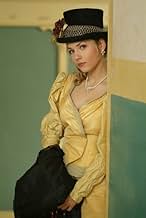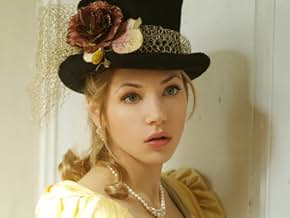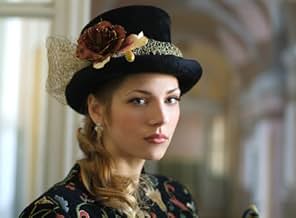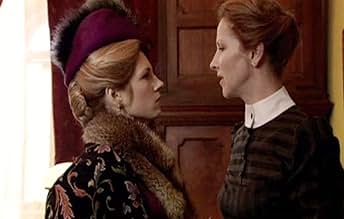IMDb रेटिंग
6.4/10
5.1 हज़ार
आपकी रेटिंग
अपनी भाषा में प्लॉट जोड़ेंViennese doctor Josef Breuer meets with philosopher Friedrich Nietzsche to help him deal with his despair.Viennese doctor Josef Breuer meets with philosopher Friedrich Nietzsche to help him deal with his despair.Viennese doctor Josef Breuer meets with philosopher Friedrich Nietzsche to help him deal with his despair.
Michal Yannai
- Bertha
- (as Michal Yanai)
Ayana Haviv
- Singer - 'Hymnus an den leben'
- (बिना क्रेडिट के)
फ़ीचर्ड समीक्षाएं
I read the book several years ago, and didn't remember much of it, beyond being fascinated by the psychological-philosophical explorations of the legendary characters and intrigued by the migraine issues that Nietszche and Breuer attempt to solve. But the book is deeply intellectual, and it was difficult to imagine it translated to the screen. Unfortunately, the director's interpretation falls very limp indeed, despite valiant attempts by a cast of worthy actors.
Melodrama substitutes in most scenes for subtlety and quiet depth. Two-dimensional beauty in the female characters substitutes for the much harder to convey inner beauty.
I found the heavy-handed artificial accents maintained by all to be especially distracting, if not constantly irritating -- the thick German/Austrian/Russian accents were like bad scenery pulling the focus from any authentic expression of the characters. The wisdom of Nietszche is disappointingly obscured in this mediocre effort.
"And if you gaze for long into an abyss, the abyss gazes also into you."
Melodrama substitutes in most scenes for subtlety and quiet depth. Two-dimensional beauty in the female characters substitutes for the much harder to convey inner beauty.
I found the heavy-handed artificial accents maintained by all to be especially distracting, if not constantly irritating -- the thick German/Austrian/Russian accents were like bad scenery pulling the focus from any authentic expression of the characters. The wisdom of Nietszche is disappointingly obscured in this mediocre effort.
"And if you gaze for long into an abyss, the abyss gazes also into you."
Knowing nothing of the book, and based solely on the DVD cover and description I expected a disappointingly shallow, titillating pseudo-intellectual romp through the fields of pretense. But the portrayal of the rare humanity of these characters as they confronted their obsessions and limitations drew me into rapt attention at the next plot development. Perhaps I'm just shallow and easily amused, but this story gave a fairly good look at a decent man, Joseph Breuer, and his struggle to really feel his humanity. This is an important story, one rarely told because how many story tellers have been through the fire of transformation to live for real? Where do you find an audience willing to sit through something they're desperately trying to avoid themselves? Maybe package it as a shallow and titillating pseudo-intellectual romp. Sure there were times when I saw through the weave of the story, for a moment I even saw Assante speaking lines rather than Nietzsche talking but for the most part this story was to me a real story of people really evolving right before our very eyes. That's not something you're going to see every day.
I just wonder how many people are going to be tuned in to seeking out and sitting through a film all about psychoanalysis, detailing very briefly the more desperate incidences in the lives of some of the most brilliant minds ever to have graced Earth. My heart hopes as many as possible but my mind tells me not many will bother, and given this that's quite a shame. The film is a concentrated study on illness and the effects of illness but the said sickness is more affiliated to love or problems of a psychological kind. The events, no matter how fabricated over history, are still compelling and the film just about works as a drama or a study of an individual's actions given their emotions that run on a dizzying high.
The film follows Josef Breuer (Cross) and Friedrich Nietzsche (Assante) who meet and attempt to help one another. The setting is 1870s Vienna in Austria at a time when some of the most brilliant minds ever would congregate to pioneer the study of psychoanalysis; love as an illness and what makes us who we are through these events. On this occasion, Nietzsche has fallen for a woman and she is Lou Salome (Winnick). This acts as the catalyst for him to seek help from Breuer, an experienced and responsible doctor who has battled his own demons in the past to do with one of his parents' early death. Nietzsche at first seeks to run from his problem, thinking escaping to Switzerland will compensate for the pain following the rejection of marriage.
But this isn't the end of it. There is no surprise that a film dealing with psychoanalysis, and containing Sigmund Freud, has a few mind games up its sleeve. The film is uncannily seductive in its general atmosphere and quite humbling on other occasions. Breuer is good friends with Sigmund Freud himself (Elman) and they both seem overly concerned with Nietzsche which propels them into at least pretending one of them needs help from Nietzsche in return.
In order to achieve this, Breuer assumes the stance that he himself is falling in love with one of his patients and requests the help from Nietzsche in return he help him get over his break up. There's a lot of psychology going on here and a lot of scenes and content that deals with mental health. Nietzsche undergoes perhaps the more interesting study of the characters because his is the more dramatic, slipping into despair and depression after initially trying to combat the break up with 'remedy' from prostitution and, like I mentioned, fleeing entirely.
The point When Nietzsche Wept has going for it the whole time is the age of these primary characters. This is not a (another?) mere look at young people in contemporary America or wherever trying to get over relationships or trying to instigate one so that they may have sex, this is a thoughtful and interesting look at people of an older age dealing with real issues that at the time, remained as scary and as ambiguous as you could possibly imagine. The frightening thing that should remain at the back of the viewer's mind is 'what if you were very ill, but you did not know of the illness you have?' Twinned with this, what if you did not know of the treatment and the pain or whatever would simply not disappear? Nowadays, we're all fine with our doctors and so forth and our teen sex comedies that act as an escapist or humoured look at coming of age or love or sex or whatever but When Nietzsche Wept is a pit stop; a look back at times past.
The film is a grand display of surrealism, dreams often beginning naturally enough before descending into chaos. We the audience ask the question of what is going on and just when it seems the impossible or the downright obscure is about to happen, our questions are answered. The film is a study into the great minds that pioneered certain theory but it's a look at their own struggles; their own struggles that helped shape an understanding in the first place. The film is a study of a delicate mentality as expressed by those of a brilliant natural intelligence.
Whether it's the bizarre manner in which Breuer refers to Freud as 'Siggy' or the odd scenes to do with diegetic classical music complete with orchestra that Nietzsche himself composes to the bemusement of those around him, the film remains an interesting look at a subject that is being dealt with head on rather than in a metaphorical or dramatic way, much like Hitchcock and Lynch have done in the past. But don't be fooled for it isn't a documentary and it does retain a fair amount of drama throughout. It may not be as good a metaphorical study but it remains interesting and thought-provoking.
The film follows Josef Breuer (Cross) and Friedrich Nietzsche (Assante) who meet and attempt to help one another. The setting is 1870s Vienna in Austria at a time when some of the most brilliant minds ever would congregate to pioneer the study of psychoanalysis; love as an illness and what makes us who we are through these events. On this occasion, Nietzsche has fallen for a woman and she is Lou Salome (Winnick). This acts as the catalyst for him to seek help from Breuer, an experienced and responsible doctor who has battled his own demons in the past to do with one of his parents' early death. Nietzsche at first seeks to run from his problem, thinking escaping to Switzerland will compensate for the pain following the rejection of marriage.
But this isn't the end of it. There is no surprise that a film dealing with psychoanalysis, and containing Sigmund Freud, has a few mind games up its sleeve. The film is uncannily seductive in its general atmosphere and quite humbling on other occasions. Breuer is good friends with Sigmund Freud himself (Elman) and they both seem overly concerned with Nietzsche which propels them into at least pretending one of them needs help from Nietzsche in return.
In order to achieve this, Breuer assumes the stance that he himself is falling in love with one of his patients and requests the help from Nietzsche in return he help him get over his break up. There's a lot of psychology going on here and a lot of scenes and content that deals with mental health. Nietzsche undergoes perhaps the more interesting study of the characters because his is the more dramatic, slipping into despair and depression after initially trying to combat the break up with 'remedy' from prostitution and, like I mentioned, fleeing entirely.
The point When Nietzsche Wept has going for it the whole time is the age of these primary characters. This is not a (another?) mere look at young people in contemporary America or wherever trying to get over relationships or trying to instigate one so that they may have sex, this is a thoughtful and interesting look at people of an older age dealing with real issues that at the time, remained as scary and as ambiguous as you could possibly imagine. The frightening thing that should remain at the back of the viewer's mind is 'what if you were very ill, but you did not know of the illness you have?' Twinned with this, what if you did not know of the treatment and the pain or whatever would simply not disappear? Nowadays, we're all fine with our doctors and so forth and our teen sex comedies that act as an escapist or humoured look at coming of age or love or sex or whatever but When Nietzsche Wept is a pit stop; a look back at times past.
The film is a grand display of surrealism, dreams often beginning naturally enough before descending into chaos. We the audience ask the question of what is going on and just when it seems the impossible or the downright obscure is about to happen, our questions are answered. The film is a study into the great minds that pioneered certain theory but it's a look at their own struggles; their own struggles that helped shape an understanding in the first place. The film is a study of a delicate mentality as expressed by those of a brilliant natural intelligence.
Whether it's the bizarre manner in which Breuer refers to Freud as 'Siggy' or the odd scenes to do with diegetic classical music complete with orchestra that Nietzsche himself composes to the bemusement of those around him, the film remains an interesting look at a subject that is being dealt with head on rather than in a metaphorical or dramatic way, much like Hitchcock and Lynch have done in the past. But don't be fooled for it isn't a documentary and it does retain a fair amount of drama throughout. It may not be as good a metaphorical study but it remains interesting and thought-provoking.
It is not a great movie. It is not a masterpiece. It may be boring and fake at first sight. But... A film about a Nietsche. Not very different of the philosopher. The character is seductive, power and Armand Assante is brilliant in his skin. The atmosphere is carefully recreated. Colors, gestures, social conceptions are pieces of a small visual museum. So, the movie is a good introduction to understand the shadows of XIX century end. For look the existence with the eyes of men of a special way to discover the essence of to be. Certainly, the film gives only sketches of great people. Lou Salome is more than strange muse of a philosopher and Nietsche is prophet in another sense than the character. No bad, no extraordinary. Only good subject of reflection. And introduction to cultural scene.
This movie is surreal. Literally, it has a lot of surrealistic scenes to mess with your mind, but also the whole presentation is surreal because there are so many bizarre angles. At its heart, it's a sober portrayal of depression and humanity's discontent (so you'd think it would be slow & heavy). But mostly it's humorous, at times as silly as the movie "Airplane!". It also features historical references, but you can't help feeling that the writer is being deliberately playful, distorting facts right before our eyes with a wink and a smile. In all, I think it's an entertaining experience, especially if you don't take it too seriously.
It definitely has the qualities of a period piece romp, like maybe "Casanova" (2005), "Molière" (2007) or one of my faves, "Impromptu" (1991) about Chopin. But "When Neitzsche Wept" has a more subtle tone which prevents me from saying it's intended to be a comedy like the others I mentioned. Also, don't expect a biopic because it's not really about any particular man so much as it's about everyman's internal struggle between passion (freedom) and logic (duty).
This film takes a somewhat light-hearted approach to a very dark subject, and I think that's what makes it unusual and clever. It's entertaining and digestible, but also there are a few powerful monologues delivered by Neitzsche (Armand Assante) that I had to rewind and hear again because they seemed to appear out of nowhere. Then suddenly we're back to a crazy scene of a redhead woman in diapers jumping around a crib. Don't worry, it all makes sense; it's just... surreal!
It definitely has the qualities of a period piece romp, like maybe "Casanova" (2005), "Molière" (2007) or one of my faves, "Impromptu" (1991) about Chopin. But "When Neitzsche Wept" has a more subtle tone which prevents me from saying it's intended to be a comedy like the others I mentioned. Also, don't expect a biopic because it's not really about any particular man so much as it's about everyman's internal struggle between passion (freedom) and logic (duty).
This film takes a somewhat light-hearted approach to a very dark subject, and I think that's what makes it unusual and clever. It's entertaining and digestible, but also there are a few powerful monologues delivered by Neitzsche (Armand Assante) that I had to rewind and hear again because they seemed to appear out of nowhere. Then suddenly we're back to a crazy scene of a redhead woman in diapers jumping around a crib. Don't worry, it all makes sense; it's just... surreal!
क्या आपको पता है
- भाव
Josef Breuer: How could I have given up everything?
Nietzsche: You'd given up everything long before you met me.
Josef Breuer: Yes, but now I have nothing.
Nietzsche: Nothing *is* everything. In order to grow strong, you must first sink your roots deep into nothingness. Learn to face your loneliest loneliness.
टॉप पसंद
रेटिंग देने के लिए साइन-इन करें और वैयक्तिकृत सुझावों के लिए वॉचलिस्ट करें
- How long is When Nietzsche Wept?Alexa द्वारा संचालित
विवरण
- रिलीज़ की तारीख़
- कंट्री ऑफ़ ओरिजिन
- आधिकारिक साइटें
- भाषा
- इस रूप में भी जाना जाता है
- Nietzsche Ağladığında
- फ़िल्माने की जगहें
- उत्पादन कंपनी
- IMDbPro पर और कंपनी क्रेडिट देखें
- चलने की अवधि1 घंटा 45 मिनट
- रंग
- ध्वनि मिश्रण
- पक्ष अनुपात
- 1.85 : 1
इस पेज में योगदान दें
किसी बदलाव का सुझाव दें या अनुपलब्ध कॉन्टेंट जोड़ें





























